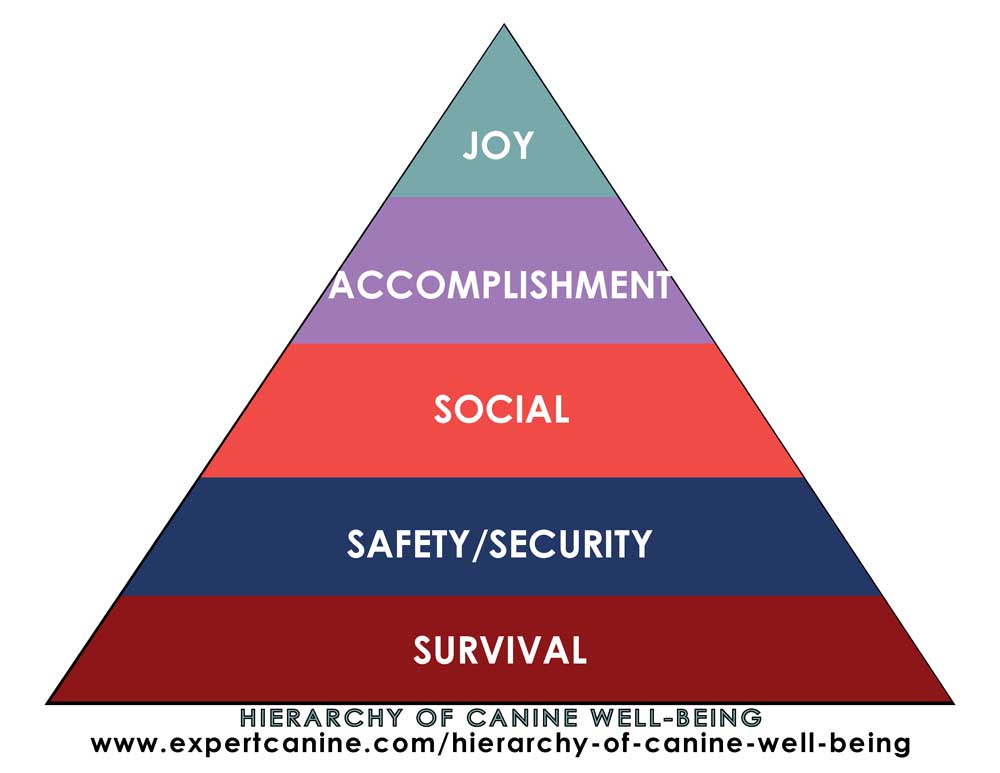Canine Corner: The myth of the tired dog
Published 12:52 pm Friday, June 14, 2019

- Hierarchy of canine well-being
Hang around enough dog people and you will hear, “A tired dog is a good dog.” Hang around a few positive reinforcement professionals long enough, and you’ll start to count the ways it isn’t true.
For example, a dog tired out from being exercised is soon going to be hungry, and sometimes hungry dogs forget their manners. A tired out dog might also become cranky or frustrated, depending on what made him tired, or maybe the tired dog will simply be exhausted and sleep the rest of the day. But frustration isn’t generally associated with better behavior, and sleeping after exercise doesn’t create good behavior; it puts behavior on hold. In the last case, then, a tired dog is simply a dog on pause. When she wakes up, behavior begins again exactly where it left off before the dog was tired.
Trending
Sometimes we may think a dog is tired or lacking energy when the dog just lies there—not sleeping, but not wanting to do much either. Is this an exhausted dog, an unhappy dog, an ill dog, an injured dog? All are possible, and one should consult one’s vet for concerns of potential illness or injury. I am not a veterinarian nor do I offer any sort of medical advice.
Working with a wide variety of dog types and ages, though, I sometimes see what may well be another consequence of the “Tired Dog” myth: Young adult dogs with limb or joint pain — judged by resistance or reactivity to touch or handling of the area. It is not commonly known among dog owners that puppies should only be carefully, lightly exercised until their growth plates have closed; as a result, many people and their puppies go joyously out into the wild blue, romping hard and far as their legs will take them, on whatever surfaces are available. Some add directed exercise such as having the pup be a jogging partner or begin agility training. This exercise, done before puppies’ growth plates are closed, can cause notable physical damage to the pup.
Growth plate closure rate differs from breed to breed, size and age. Ask your vet to get a best estimate for your dog, but understand that being sure would require medical imaging. One might also opt to play it safe by waiting longer than best estimates.
I’ve seen the sweetest of young adult dogs suddenly snark at a beloved person for what would seem like no reason, when touched in a growth plate area. How sad if this were misinterpreted as aggression—idiopathic or otherwise—merely because the sweet dog and his loving owner didn’t realize that too much frolic as a puppy could cause lasting harm. Given that some folks will euthanize a dog simply for “touching teeth to human skin”—a policy with which I disagree for reasons including the one just mentioned, yet a policy that is carried out frequently—it is important to advocate for our dogs from day one. Sometimes that may mean playing on a soft carpet with toys rather than running around outside on pavement, rather than jumping in and out of cars or on and off of furniture.
If tiring a dog is not the secret to a having a good dog, then what is? There’s a long answer and a short answer. For the long answer, consult a CBCC or other certified R+ trainer. But here’s the short answer: A dog whose needs are met becomes a good dog.
I created the Hierarchy of Canine Well-Being, a simplified version of which is shown below. Please view the full version, which details each level, here: www.expertcanine.com/hierarchy-of-canine-well-being. It is inspired by psychologist Abraham Maslow’s Hierarchy of Needs. Just as the human animal has a variety of needs, so does the canine animal.
If you are wondering whether tiring out a dog in order to get a dog to ‘be good’ might be contrary to well-being, Brava. While exercise is a health (survival) need, compelling exercise to exhaust an animal in order to control behavior is likely skipping one or more of the other needs as well as a potential threat to health (survival).
I’ll discuss details and caveats to each of the need levels in future articles. Drop me a note if you have questions in the interim.
Rain Jordan, CBCC-KA, KPA CTP, is a certified canine behavior and training professional. Visit her at www.expertcanine.com






